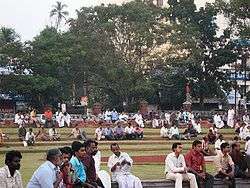Idle
_-_Google_Art_Project.jpg)
Idle (idling) is a term which generally refers to a lack of motion and/or energy.
Uses
In describing a person or machine, idle means the act of nothing or no work (for example: "John Smith is an idle person"). This is a person who spends his days doing nothing could be said to be "idly passing his days." (For example: Mary has been idle on her instant messenger account for hours.) A computer processor or communication circuit is described as idle when it is not being used by any program, application or message. Similarly, an engine of an automobile may be described as idle when it is running only to sustain its running (not doing any useful work), this is also called the tickover (see idle).
Idleness as dependent upon cultural norms
Typically, when one describes a machine as idle, it is an objective statement regarding its current state. However, when used to describe a person, idle typically carries a negative connotation, with the assumption that the person is wasting their time by doing nothing of value.
Such a view is reflected in the proverb "an idle mind is the devil's workshop". Also, the popular phrase "killing time" refers to idleness and can be defined as spending time doing nothing in particular in order that time seems to pass more quickly. These interpretations of idleness are not universal – they are more typically associated with Western cultures. Idleness was considered a disorderly offence in England punishable as a summary offense.[1]
Involuntary enforced idleness is the punishment used for lazy or slacking workers in zero-hour contracts. Paid time off, which was introduced in the 20th century as a trade unionist reform, is now absent from an increasing number of job arrangements both as a money-saving mechanism and so that only work pays and thus reinforcing the stigma against idleness and enabling nature’s punishment of idleness in the form of destitution and starvation. Asking for holiday leave is now in the UK also frowned upon in traditional full-time contracts as it is taken to be a sign of lack of commitment and team spirit and as a propensity to laziness, and it is often punished, and is considered by most as a sackable offence.
Books on idleness

The state of being idle is sometimes even celebrated with a few books on the subject of idleness. How to Be Idle by Tom Hodgkinson is one such example from an author who is also known for his magazine, "The Idler", devoted to promoting its ethos of "idle living". Nobel Laureate Bertrand Russell's In Praise of Idleness; And other essays is another book that explores the virtues of being idle in the modern society.
Mitchell Stevens has published a small mini-series magazine entitled "How idle are you?" which goes over basic idle concepts. (Source: North Shore Times Advertiser)
Mark Slouka published his essay, "Quitting the Paint Factory: The Virtues of Idleness" in the November 2004 Harper's Magazine, hinting at a post-scarcity economy, and linking conscious busy-ness with antidemocratic and fascist tendencies.
See also
- Work (disambiguation)
- Laziness
- Leisure
- Loitering
- Inert
- Work aversion
- Soldiering
- Refusal of work
- The Importance of Being Idle (disambiguation)
References
- ↑ "ANOTHER branch of ſummary proceedings is that before juſtices of the peace, in order to inflict divers petty pecuniary mulcts, and corporal penalties, denounced by act of parliament for many diſorderly offences; ſuch as common ſwearing, drunkenneſs, vagrancy, idleneſs, and a vaſt variety of others, for which I muſt refer the ſtudent to the juſtice-books formerly cited, and which uſed to be formerly puniſhed by the verdict of a jury in the court-leet." Commentaries on the Laws of England, Sir William Blackstone
Further reading
- Jordan, Sarah (2003). Anxieties of Idleness: Idleness in Eighteenth-century British Literature and Culture. London: Anxieties of Idleness: Idleness in Eighteenth-century British Literature and Culture. ISBN 0-8387-5523-2.